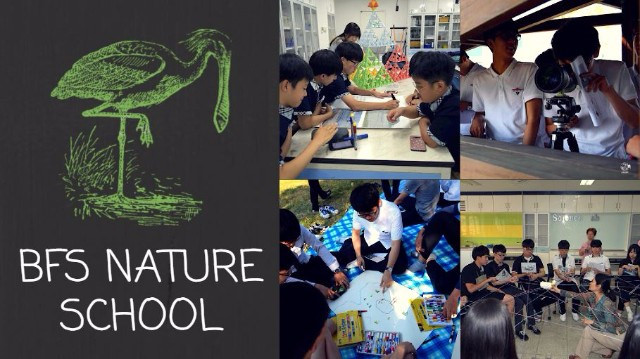A black-faced spoonbill focused educational programme attracts Korean students in droves.
The Black-faced Spoonbill (BFS) Nature School began in April 2016 with the goal of raising awareness of students in Incheon, Republic of Korea, on the importance of migratory waterbirds and their habitats. The School, run by local science teachers, is led by Ms. Sunjeong Nam of the Incheon BFS Network, with the technical support of the East Asian-Australasian Flyway Partnership (EAAFP) Secretariat.
This year the Secretariat was happy to see that the number of students participating in BFS Nature School increased by nearly 600 hundred to 922, compared to the previous year.
Students from Incheon, Korea, learning about migratory waterbirds and their habitats. Image courtesy of EAAFP
The curriculum consists of lectures, activities, and field trips. In the first class, students learn about migratory waterbirds (especially BFS) and the importance of international cooperation for environmental conservation.
The second class covers the birds’ primary habitat – wetlands, while the third class serves to deepen the students’ understanding of biodiversity.
Finally, students are able to embark on field trips to see spoonbills in the field – at Namdong Reservoir, a significant breeding site that supports nearly 10% of the current population. There, middle and high school students plan how to conserve and utilise the Reservoir, while elementary school students pen poems and stories about BFS.
Through the lectures, activities, and discussions, the students can relate that their own lives and culture are deeply tied to wetlands, and appreciate the importance of maintaining healthy wetlands in Korea. In fact, Korea’s most famous cultural export, Kimchi, would not have developed without wetlands!
In 2016, some Korean students from Incheon had the opportunity to join the International Skype Meetings on the BFS with Hong Kong and Taiwan. These were ideal opportunities for students across the globe to feel and understand that they share the same species with other countries, regardless of borders.
To both prioritise and mainstream the conservation of migratory waterbirds and their habitats throughout society, such comprehensive education needs to become established as part of the standard school curriculum.
While education and activities can be tailored to the local level, adding international viewpoints can help encourage students to start thinking about environmental issues at a more global scale. The example set by BFS Nature School shows the potential of programs like these, where the number of the teachers taking part is steadily increasing. Below are some of the students’ reactions after taking part in BFS Nature School:
• I learned about the meaning of the future if there are no BFS anymore.
• I came to know that the reclamation is not a good thing. It makes biodiversity lower!
• Through various activities and diverse perspectives, I learned our duty in life, and how important conservation is.
• Before class, I hated the living creatures, now I appreciate them.
• This class is not for exam. I can feel the meaning of conservation more vividly.
The black-faced spoonbill is a globally endangered species with vulnerable breeding colonies and deteriorating wintering sites. Spoonbills live in coastal inter-tidal habitats, which are threatened by reclamation and pollution in eastern Asia.
Black-faced spoonbills breed on islets off the west coast of North Korea and South Korea, and Liaoning province in mainland China. It has been reported in the Tumen estuary of Russia, and breeding was recorded in South Primorye for the first time in 2006.
In South Korea, the major breeding sites are Ganghwa-do (280 birds), Songdo and Yeongjong-do (100) and other islets in Incheon Tidal Flatand Shiwa Lake (100) and Saemangeum area (80). Since 2006, Black-faced Spoonbills have been visiting and breeding at Namdong Reservoir an artificial island within Songdo city. Approximately 100 pairs of Black-face Spoonbill breed now at this artificial island, but this population is threatened by on-going reclamation on Songdo mudflat.
Story and information from East Asian-Australasian Flyway Partnership (EAAFP) newsletter and website.


